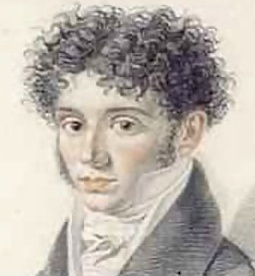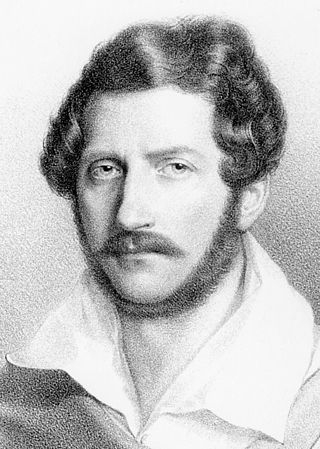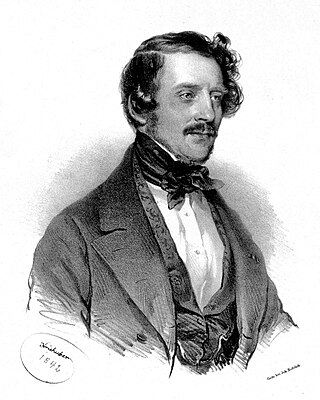
Vincenzo Salvatore Carmelo Francesco Bellini was an Italian opera composer famed for his long, graceful melodies and evocative musical settings. A central figure of the bel canto era, he was admired not only by the public, but also by many composers who were influenced by his work. His songs balanced florid embellishment with a deceptively simple approach to lyric setting.

Domenico Gaetano Maria Donizetti was an Italian composer, best known for his almost 70 operas. Along with Gioachino Rossini and Vincenzo Bellini, he was a leading composer of the bel canto opera style during the first half of the nineteenth century and a probable influence on other composers such as Giuseppe Verdi. Donizetti was born in Bergamo in Lombardy. At an early age he was taken up by Simon Mayr who enrolled him with a full scholarship in a school which he had set up. There he received detailed musical training. Mayr was instrumental in obtaining a place for Donizetti at the Bologna Academy, where, at the age of 19, he wrote his first one-act opera, the comedy Il Pigmalione, which may never have been performed during his lifetime.

I puritani is an 1835 opera by Vincenzo Bellini. It was originally written in two acts and later changed to three acts on the advice of Gioachino Rossini, with whom the young composer had become friends. The music was set to a libretto by Count Carlo Pepoli, an Italian émigré poet whom Bellini had met at a salon run by the exile Princess Belgiojoso, which became a meeting place for many Italian revolutionaries. The opera is based on Têtes Rondes et Cavaliers, a historical play written by Jacques-François Ancelot and Joseph Xavier Saintine and set in the English Civil War, which some sources state was based on Walter Scott's 1816 novel Old Mortality, while others state that there is no connection.

Adelson e Salvini is a three-act opera semiseria composed by Vincenzo Bellini from a libretto by Andrea Leone Tottola. The opera was based on the 1772 novel Épreuves du Sentiment by François-Thomas-Marie de Baculard d'Arnaud, and it draws on a previously performed French play of 1803 by Prospère Delamare.

Il campanello or Il campanello di notte is a dramma giocoso, or opera, in one act by Gaetano Donizetti. The composer wrote the Italian libretto after Mathieu-Barthélemy Troin Brunswick and Victor Lhérie's French vaudeville La sonnette de nuit. The premiere took place on 1 June 1836 at the Teatro Nuovo in Naples and was "revived every year over the next decade".

Alahor in Granata is an opera in two acts by Gaetano Donizetti to an anonymous Italian libretto after Jean-Pierre Claris de Florian's text Gonzalve de Cordoue, ou Granade reconquise (1793). However, it seems that the original basis of the libretto goes back to one by Felice Romani written for Meyerbeer in 1821, which in turn can be traced back through another iteration to begin with the de Florian version.

Ugo, conte di Parigi is a tragedia lirica, or tragic opera, in two acts by Gaetano Donizetti. Felice Romani wrote the Italian libretto after Hippolyte-Louis-Florent Bis's Blanche d'Aquitaine. It premiered on 13 March 1832 at La Scala, Milan.

Marino Faliero is a tragedia lirica, or tragic opera, in three acts by Gaetano Donizetti. Giovanni Emanuele Bidera wrote the Italian libretto, with revisions by Agostino Ruffini, after Casimir Delavigne's play. It is inspired by Lord Byron's drama Marino Faliero (1820) and based on the life of Marino Faliero (c.1285-1355), the Venetian Doge.

Torquato Tasso is a melodramma semiserio, or "semi-serious" opera, in three acts by Gaetano Donizetti and based on the life of the great poet Torquato Tasso. The Italian libretto was written by Jacopo Ferretti, who used a number of sources for his text, including works by Giovanni Rosini, Goethe, Goldoni and Lord Byron, as well as Tasso's actual poetry. It premiered on 9 September 1833 at the Teatro Valle, Rome.

Deux Hommes et une femme, also known as Rita, is an opéra comique in one act, composed by Gaetano Donizetti to a French libretto by Gustave Vaëz. The opera, a domestic comedy consisting of eight musical numbers connected by spoken dialogue, was completed in 1841. Never performed in Donizetti's lifetime, it premiered posthumously at the Opéra-Comique in Paris on 7 May 1860.

Bianca e Fernando is an opera in two acts by Vincenzo Bellini.

Imelda de' Lambertazzi is a melodramma tragico or tragic opera in two acts by Gaetano Donizetti from a libretto by Andrea Leone Tottola, based on the tragedy Imelda by Gabriele Sperduti. It received its first performance on 5 September 1830 at the Teatro San Carlo, Naples.

Gianni di Calais is a melodramma semiserio, a "semi-serious" opera in three acts by Gaetano Donizetti (1828), from a libretto by Domenico Gilardoni, based on Jean de Paris by Louis-Charles Caigniez.

Gianni di Parigi is an 1839 melodramma comico in two acts with music by Gaetano Donizetti to a libretto by Felice Romani, which had previously been set by Francesco Morlacchi in 1818 and by Giovanni Antonio Speranza in 1836.

La zingara is an opera semiseria in two acts by Gaetano Donizetti, set to a libretto by Andrea Leone Tottola after La petite bohémienne by Louis-Charles Caigniez, which was itself derived from a work of August von Kotzebue.

Alfredo il grande is a melodramma serio or serious opera in two acts by Gaetano Donizetti. Andrea Leone Tottola wrote the Italian libretto, which may have been derived from Johann Simon Mayr's 1818 opera of the same name. The opera tells the story of the Anglo-Saxon king Alfred the Great.

Don Gregorio is an 1826 opera by Gaetano Donizetti from a libretto by Jacopo Ferretti and adapted from his popular 1824 opera buffa L'ajo nell'imbarazzo, which had enjoyed considerable success when presented at the Teatro Valle in Rome on 4 February 1824.

Una follia is a farsa in one act by composer Gaetano Donizetti. The work premiered on 15 December 1818 at the Teatro San Luca in Venice. The opera uses the same Italian-language libretto by Bartolomeo Merelli after August von Kotzebue's Der Graf von Burgund that Donizetti used for his Enrico di Borgogna a month earlier, but with different music. It was given one performance and "never performed again, and its score has never been found."
Domenico Gilardoni (1798–1831) was an Italian opera librettist, most well known for his collaborations with the composers Vincenzo Bellini and Gaetano Donizetti.











